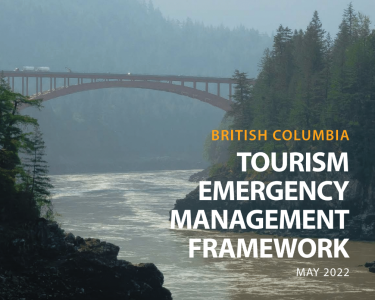
In conjunction with Emergency Preparedness Week, a collaborative Tourism Emergency Management Committee (TEMC) has released a new BC Tourism Emergency Management Framework to help reduce the industry’s vulnerabilities and risks and lessen the potentially adverse impacts to visitor experiences during emergencies.
The framework provides a unified structure to support tourism partners and visitors on matters related to the four pillars of emergency management…specifically mitigation, preparedness, response, and recovery. It also supports the Province of British Columbia’s comprehensive emergency management plans by strengthening integration and consideration of visitors and the visitor economy before, during and after an emergency event. This includes addressing visitors’ unique needs during emergencies, improving tourism industry preparedness, managing long term destination reputation, and reducing economic impact to tourism businesses.
As BC’s visitor economy continues to recover from the devastating impacts of the COVID-19 pandemic, there is a strong need for a coordinated approach to emergency management for the tourism sector, particularly given anticipated future crises such as wildfires, flooding, heat domes and another pandemic that could affect BC’s visitor economy and the province’s reputation as a safe and welcoming destination.
Created on behalf of the industry by the TEMC consisting of committee co-chairs TIABC (Tourism Industry Association of BC) and TACS (Ministry of Tourism, Arts, Culture & Sport), along with Destination BC, Indigenous Tourism BC, BC Destination Marketing Organization Association, BC Regional Tourism Secretariat, and Emergency Management BC, the framework ensures that tourism partners collaborate, play a role, and are aligned with the BC emergency management system.
The TEMC is responsible for overseeing ongoing work that advances the objectives of the framework and components of an operational work plan that includes training, response, and communication, which is reviewed and updated regularly. In recent years, the industry has relied on a multi-faceted Tourism Emergency Response Team (TERT) to consolidate information on various crises, coordinate mutual assistance efforts, identify potential issues for the tourism sector, among other things. TERT will be reactivated when the next emergency situation occurs that affects much of the province or an entire region.
QUOTES
“Every single person connected to the tourism industry demonstrated incredible strength and leadership during the COVID-19 pandemic and the climate crisis that prompted last year’s heat event, floods, and wildfires. Tourism operators and staff were unsung heroes during these difficult times as they pivoted quickly to realign their businesses and keep locals and visitors safe. Together, through the BC Tourism Emergency Management Framework, we are building a plan so we are prepared to strengthen the support of the unique needs of our locals and visitors during emergencies and continue to build back stronger by making our province even safer.”
Honourable Melanie Mark, Minister of Tourism, Arts, Culture & Sport.
“The BC Tourism Emergency Management Framework is an invaluable tool that puts people first to protect our residents, livelihoods, and visitors. Emergency preparedness is key to building resiliency in our communities and the work done to establish this framework helps us future-proof our province-wide ability to respond to a crisis. It is a major milestone to support the tourism industry to proactively reduce economic impact to tourism businesses during times of crisis.”
Jennifer Rice, Parliamentary Secretary for Emergency Preparedness – Ministry of Public Safety and Solicitor General
“Aside from the devastating impacts of the pandemic, as a sector we’ve seen the hardships that operators, employees, local communities, and visitors have experienced due to multiple unpredictable crises in recent years. This framework is vital to help guide the tourism industry in its role and response to major emergencies in British Columbia, and to ensure that our visitor economy can both withstand and recover from similar situations in future.”
Walt Judas, CEO – Tourism Industry Association of British Columbia (TIABC)
“Through all stages of any province emergency, Destination BC remains committed to supporting BC’s tourism industry, from planning and coordinating communications, to initiating marketing campaigns, coordinating training delivery, and conducting research on tourism emergency management and impacts. As an industry, we have leaned on collaboration more than ever to navigate new hardships over the last two years, and it is this level collaboration…evident in the BC Tourism Emergency Management Framework…that will continue to play a fundamental role in supporting the long-term destination reputation of British Columbia and our resilience as an industry.”
Richard Porges, President & CEO – Destination British Columbia
“We all have an important part in lessening the impacts by having a framework that allows us to be better prepared for emergencies or disasters. The new Tourism Emergency Management Framework is a guide for industry during various crises. The industry partners have worked with government to build a solid framework in disaster risk reduction and response for the tourism sector and Indigenous communities both locally and provincially.”
Brenda Baptiste, Chair – Indigenous Tourism British Columbia (ITBC)
“Community destination marketing organizations (DMOs) are fully supportive of this new framework and have been an integral part of the collaboration that has brought this to fruition. Our industry and our communities will continue to work together as we face the unknowns of the future. This framework will give our DMOs the guidance and the ability to address the unique needs of visitors and residents and ensure there is alignment with the BC emergency management system.”
Nancy Small, CEO – Tourism Richmond; Chair – BC Destination Marketing Organization Association
“The BC Tourism Emergency Management Framework will help visitors and tourism operators to be prepared when they need it most – in the unexpected moment when a crisis impacts people in the community and the region. By working together, the BC tourism industry can better support visitors, businesses and communities through recovery.”
Anthony Everett, CEO – 4TVI/Tourism Vancouver Island; Chair – BC Regional Tourism Secretariat
About Emergency Preparedness Week (May 1-7)
Emergency Preparedness Week (EP Week) is a national event supported by Public Safety Canada, working closely with provincial and territorial emergency management organizations, Indigenous organizations, non-governmental organizations, and the private sector who support activities at the local level. EP Week encourages individuals and businesses to take action to ensure you are prepared to protect yourself, your family and your community during an emergency. This year, the theme is Emergency Preparedness: Be Ready for Anything. The intent of this theme is to encourage Canadians to take action to become better prepared for the range of emergencies they could face in their region.
RESOURCES
Destination BC: https://www.destinationbc.ca/what-we-do/destination-management/emergency-preparedness/
TIABC: https://tiabc.ca/emergency-preparedness/
Emergency Management BC: https://www2.gov.bc.ca/gov/content/safety/emergency-management/emergency-management/provincial-emergency-planning





